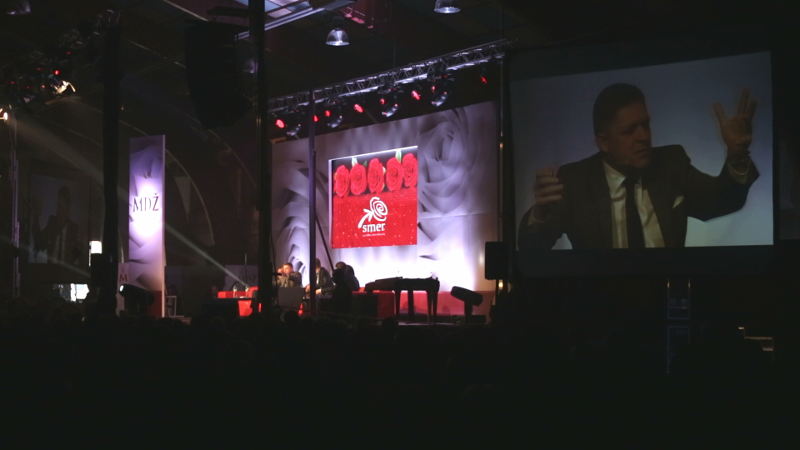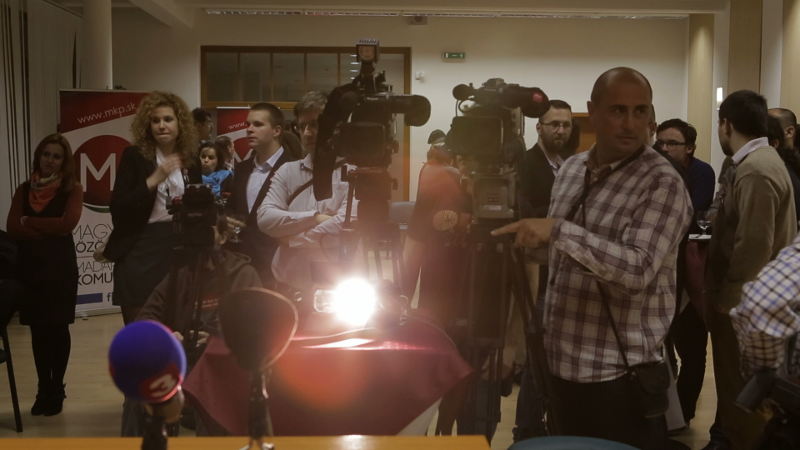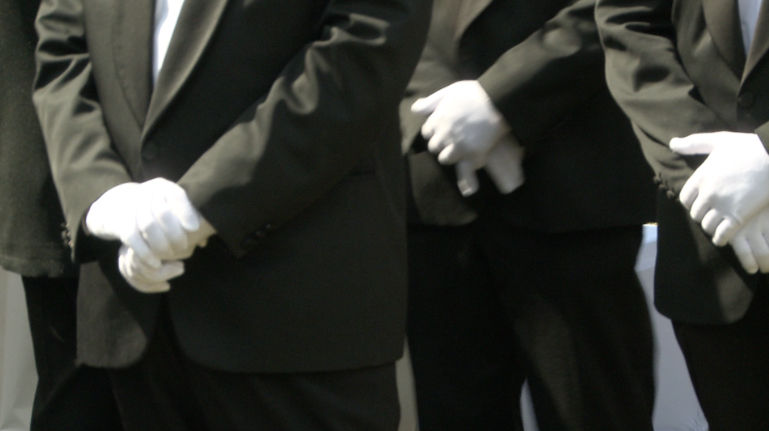From Disillusionment to Kiska
Slovak documentarian Zuzana Piussi ventured vigorously into a another project tackling a political issue. Her new film Difficult Choice focuses on presidential campaigns in Slovakia, providing a look behind their scenes without taking sides. We talked about political campaigning, her work and the political situation in Slovakia with documentarian and virtual campaign maker Jan Látal (JL) and documentarian, lecturer and curator Andrea Slováková (AS).
The distribution strategy of Difficult Choice was rather specific in that the Slovak premiere of the film was held only several hours before the parliamentary elections. What do you think about this gesture?
JL: In terms of marketing, it’s a great strategy. It is key to release information when it’s relevant to the society. And people tend to focus on politics mainly during the last week before the elections, so in that sense it was excellent timing.
AS: I see, so that’s why the political party of Rado Procházka was such a flop compared to what the opinion polls had indicated! The film asks what and why we should (not) believe in political campaigns. It promotes critical thinking in connection with decision-making and voters’ choices. It was an excellent strategy.
In the beginning, the film raised the question of why people don’t go to vote – and this is also my second question.
AS: There’s no simple answer to that question. In the society we’re living in I consider it my civil obligation to go to elections. So I can only speculate. The loss of trust in politicians sounds like an alibi – also in this film. We don’t live in anarchy, the state is managed by elected representatives. If the nation lacks political elites, it is not only the problem of the “idiots at the top”, but a more complex issue including for example the education system. Changeable from below and from above. Rather than complaining about useless politicians, we should (each from our own position) do at least something to contribute to the formation of intellectual and political elites, but also to the level of critical thinking among the citizens so that they could actively reflect on and act in interaction with those who should take care of the state’s management as civil servants.
JL: However, this question is not the film’s main focus. I saw the film rather as a look into the anatomy of power, Showing how we can govern ourselves, how those who govern and those who are governed need each other. They all have the best intentions. From my own experience I know that politicians often think that they are emissaries of good. From afar, it may look like profiteering and a will to control. However, I believe that every politician is convinced to be working towards the common good.

Difficult Choice (Zuzana Piussi, 2016)
What role do opinions and commentary of philosopher Bělohradský play in the structure of Difficult Choice?
AS: Philosopher and currently a candidate for the Czech senate Bělohradský sitting in a carved wooden armchair next to his library presents consistent argumentation. His role in the film is functional because his analytical comments can help the viewers reflect on their own convictions and opinions.
JL: The film illustrates a principle described by Bělohradský as the authenticity of a first-time statement. When we hear Fico saying that he will go out and kiss women for the first time, it’s funny. But when we hear it for the second and the third time? The author catches us in the same trap against which she warned us earlier. That’s refreshing.
What image of Slovak politicians has Zuzana Piussi created?
JL: Andrej Kiska greatly surprised me – his way of communicating with people and ability to articulate thoughts on the spot. His energy was so impressive and convincing when talking to the students in the school scene. I envy the Slovaks their authentic president. I guess that in his bed at night, Fico is also wondering whether people like him or not. Whether they will perhaps build him a monument one day. I believe that the positive and the negative characters may share a similar motivation.
“Difficult Choice shows that democracy is capable of self-preservation.”
AS: I was impressed to see that Kiska did not strive for power. The one who had been called a non-politician suddenly appeared to be the best politician – who has realised that he should work and think in favour of democracy (not democracy as defined by Bělohradský).
Is it possible to see Difficult Choice as an objective documentary as it is presented in some media?
JL: It might be seen as objective in the sense that it doesn’t take sides. But it is an opinionated documentary. Surprisingly, this is good news about democracy. Despite the metaphor of indifferent rats, an apolitical president is elected in the end. That proves that the established system has a self-preserving feedback. When you repeatedly have politicians whom the society cannot or doesn’t want to trust, there still is a chance that they can elect someone who will inspire their trust.

Difficult Choice (Zuzana Piussi, 2016)
AS: No documentary film or filmmaker can always be objective. Only by their way of framing the images, selection of scenes and subsequent editing choices, authors make their films subjective – which is totally fine, because we’re watching a work of art. When seeing them sitting with the camera next to Kiska at the back of the car, I recalled Leacock’s and Drew’s Primary, as if this take was a direct quotation from the film. The authors of Primary tried to achieve some balance by providing each of the candidates equal space. And still, you can make a completely different picture about each of the observed politicians! Also in Piussi’s film, it is important that politicians are captured behind the scenes – how they act and how they speak. We can see how uncertain they are, but also that they, to a certain extent, don’t drop out of their roles.
“Thanks to the observational method, we can see how people behave, but less how they think.”
JL: It’s unbelievable how close Zuzana got to some of the politicians. Especially those who had not been known through media revealed a lot about themselves. Fico didn’t need her, but she needed him. But with the other politicians, it was the other way round. It was fascinating how open they were about almost everything on camera. The financial resources and strategic decisions during campaigns in the Czech Republic are only dealt with behind closed doors. They disclosed everything in front of the camera. In this respect, Difficult Choice is a valuable film that literally gets on politicians’ skin – which would otherwise be considered almost a contradiction. They are trained not to reveal too much about themselves.
AS: She’s very brave. She doesn’t care what “impression” each of the portrayed politicians will make; her position can be apparent in how she is observing public figures – being interested in their behaviour in various situations. “The observational method reveals how people behave, but less how they think.”
What do you think about the opinion of the PR expert Marek Prchal that a politician is only a product in terms of the marketing campaign?
AS: Yes, from the marketing perspective, politicians are advertised products. At least until the moment when audio-visual media became involved in political campaigns.
“Politicians often lack the courage to be themselves.”
JL: Each product addresses some problems of the target group. In this respect, a politician is truly a product. Which, in itself, needn’t be meant as a derogatory statement. Politicians should be addressing problems of their electorate. However, when problems start to be artificially created to evoke demand for the product, we are in trouble.

Difficult Choice (Zuzana Piussi, 2016)
Why can’t people be themselves and try to hide behind marketing strategies and campaigns and follow advice of PR specialists on how to appear in public and how to win people over?
JL: They lack the courage to be themselves. And if you invest some capital in your campaign that is not even yours, you have an obligation. You can’t be yourself because you are responsible to others. And you start strategizing about what card to play. When we produced a campaign for the Green Party, the marketing polls showed that more than in the quality of education, people are interested in kindergarten capacities. Then you have two options – to remain fully true to yourself and convince the society that your topic is relevant, which is not well possible with invested capital, Or to tailor your portfolio to the people’s needs. But it should always stem from the values that you are promoting. Situations in which you are declaring something that you don’t actually believe sooner or later end in a fiasco.
AS: And what would it mean “to be yourself”? Isn’t every person in social interaction “different” depending on what he or she is confronted with? For me, there’s just one concept of “being oneself”, and that is the integrity of the character. However, it does not necessarily have to be directly related with the existence of marketing.
The film features journalist Jakub Patočka, who mentions the influence of media. He believes that media somehow set an initial agenda regarding what topics should be discussed, which the voters subsequently take for their own and the candidates then try to accommodate these needs in their campaigns. Do you agree?
JL: As a society, we all are one interconnected organism. It’s impossible to blame something on one political party. Media set the agenda according to our needs, and vice versa. Hence, all links in the chain are to blame for manipulation. It is important to try to identify one’s own share and to work with it.
AS: In my opinion, Jakub Patočka is the most populist of all the characters in the film, and I don’t find his opinions worthy of commenting. I was surprised that such a dramaturgically well-structured film, aside from a multi-layered philosophical analysis also provides space to generalisations by an “expert”, “journalist and politician”, none of them being able to reflect on the environment from which the observed protagonists come. This might have been supposed to help achieve a higher level of generalisation; however, in the case of Jakub Patočka, these are only empty words that you can usually hear in pubs that do not convey anything specific, revealing, original, or even analytically valuable.



